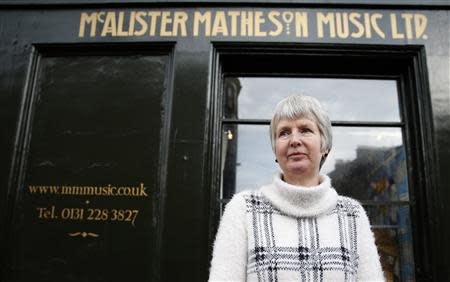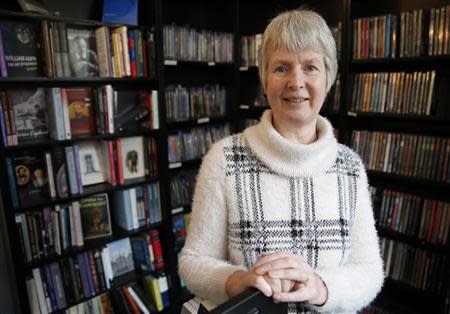Giving up pound tops business doubts over independent Scotland
By David Milliken EDINBURGH (Reuters) - Like many Scots, shop owner Anne McAlister is drawn to the idea of independence but cannot throw off nagging doubts about splitting from the rest of the United Kingdom. McAlister would like public policies that are more left wing than Britain's Conservative government is going to provide. On the other hand, she runs a classical music store in the centre of Edinburgh and sells compact discs to English customers by mail. Losing the pound could make that harder. "I would prefer Scotland to have a lot more power and a lot less of Mr Cameron and Mr Osborne," she said, referring to Britain's prime minister and Chancellor. "But what I and my customers would find really difficult is another currency." Businesses in Scotland - who send 70 percent of their exports to the rest of the United Kingdom - are increasingly focusing on the independence referendum due on September 18. A key issue is what currency Scotland would use if the country splits from the UK. Campaigners for scrapping the 300-year-old union want Scotland to keep the pound, a.k.a sterling. The British government says it would be highly unlikely to agree to that. Last week, Bank of England Governor Carney cited the euro zone crisis to stress the challenge of making a shared currency area work - and to show voters that Scotland might lack control over large areas of policy even after independence. Without a deal, an independent Scotland could introduce its own currency, possibly pegged to sterling. Or it could use sterling without London's blessing, as Ecuador and Panama use the U.S. dollar. Either could leave Scotland exposed to attack by speculators as it ventures into global financial markets. Brad MacKay, a management professor at the University of Edinburgh who has interviewed 50 firms on the prospect of independence, detects some signs of concern. Most companies are wary of alienating customers by entering the heated debate. Several he spoke to, though, have negotiated break clauses in their property leases which can be activated in the event of independence. Power company SSE said last year that independence made Scotland a riskier bet for investment, and Royal Bank of Scotland has warned it could relocate to London. Energy giant BP warned on Tuesday of "big uncertainties". Most of Britain's oil and gas lies off the Scottish coast, and they would probably become a mainstay of an independent Scotland's economy, which is now about the size of New Zealand's. But exactly how they would be divided is up for negotiation. "This is an unprecedented scenario, and there is real and genuine uncertainty," MacKay said. "There's generally concern that some of these issues haven't been worked through." MISPLACED CONCERNS? Scottish nationalists argue the concerns are misplaced. They say the rest of the United Kingdom will recognise that its own interests will be best served by agreeing to a currency union with an independent Scotland, given their close economic ties. Scotland's First Minister, Alex Salmond, said last week that former Bank governor Mervyn King had told him that London would ease its stance in the event of a vote for independence. Recent polls suggest such a vote is increasingly likely. An ICM survey last month showed that 37 percent of Scots supported independence, 44 percent opposed it and 19 percent were undecided - far closer than polls last year. Ivan McKee, a businessman involved in manufacturing and a pro-independence campaigner, saw no need for the ruling Scottish National Party to say what it would do if it could not reach a deal with London. Last month, Britain's finance ministry said it would honour all UK debt if Scotland voted for independence - and seek recompense from Edinburgh - ending uncertainty that it might try to shift some government bonds to the Scottish government. "They had to step in to calm market fears about the debt," McKee said. "I think we will see more of that, as the real world impinges on this head-in-the-sand approach." History gives little guide as to how any talks might play out. Scotland and the rest of Britain entered political and economic union in 1707, when physicist Isaac Newton supervised the introduction of new coins. But Scotland kept aspects of an independent state, with its own legal system and banknotes. BUSINESS WORRIES The impact of independence would vary among businesses, MacKay said. Some sectors, such as energy and biotechnology, would be relatively unaffected, given Scotland's oil and gas reserves and strong university research departments. But independence would be more problematic for other companies, particularly manufacturers that rely on British government defence contracts and financial services vulnerable to any currency uncertainty or extra regulatory costs. Owen Kelly, the head of Scottish Financial Enterprise, a trade body for Scotland's large banking, insurance and asset- management sector, worries that a vote for independence could require the BoE to step in and provide temporary support. "If there was a 'yes' vote, then I think there would be some very early activity from regulators and others to address the immediate volatility that would follow," he said. Even if the two governments did agree a monetary union, it could prove vulnerable if markets doubted their long-term commitment, said Angus Armstrong, an academic at the London-based National Institute for Economic and Social Research. Unlike the euro zone, whose member states are bound to ever-closer union, the Scottish government has not committed itself to keeping the pound indefinitely, and investors might demand a premium on sterling-denominated Scottish debt. But although there could be short-term costs to the transition to a new country, and potentially a new currency, Armstrong said Scots needed to take a long-term view. "Independence is not an overnight thing, it is something that will last generations. It is up to the people of Scotland to decide whether it would be worth it." (Editing by William Schomberg, Larry King)

 Yahoo News
Yahoo News 

